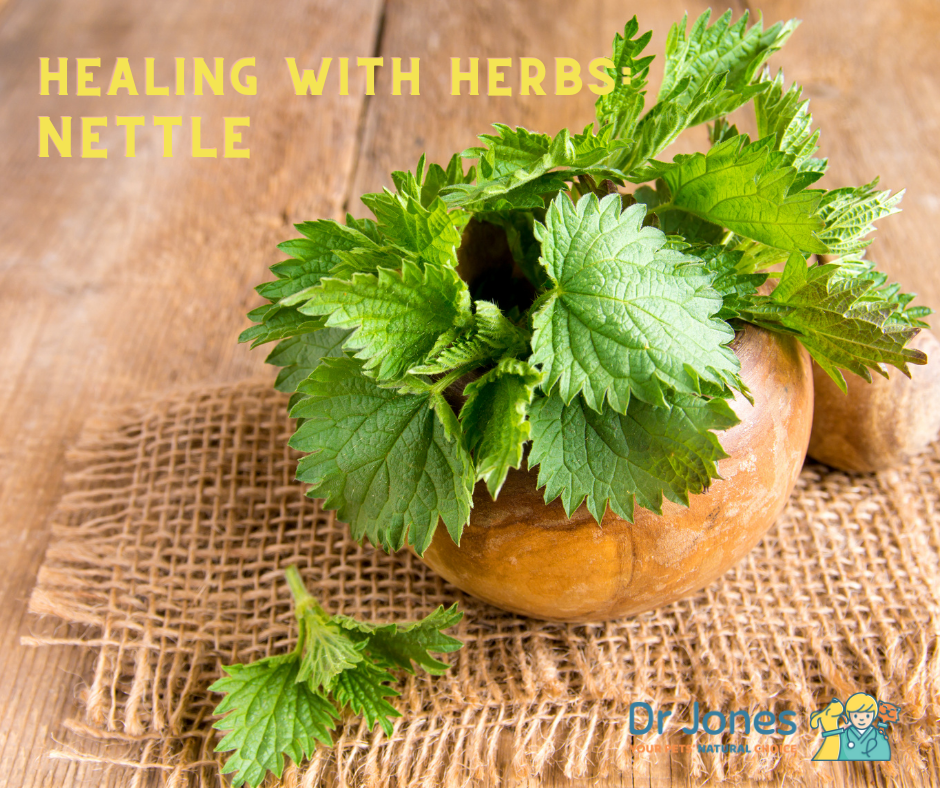Healing with Herbs: Nettle

A perennial herb known for it’s itchy rash when exposed to skin, Nettle is actually an excellent natural option for a variety of ailments and has been used for thousands of years. Today is part 3 of my 4-part healing with herbs series.
History of Nettle
Native to Europe, Asia, Northern Africa and North America, nettle has been used as far back as the Bronze age (3000 BCE -1200 BCE). Many Indigenous peoples have utilized stinging nettles in ceremony, medicine, food, and clothing. The leaves, stems and sometimes the roots are used.
Uses and Forms of Nettle
Uses of Nettle are varied and almost endless, they have through history been used for:
- Reducing Inflammation
- Diuretic and Laxative
- Respiratory issues
- Wounds and Infections
- Throat and Mouth Infections
- Hormone Support and Urinary Issues
- Gout
- Allergies
- Eczema
It can be administered in a variety of forms, such as:
- Tonics
- Teas
- Tinctures
- Dried Herb
- Poultice
General Health Benefits
It has a gentle, stimulating effect on the lymphatic system, enhancing the excretion of wastes through the kidneys.
Nettle’s iron content makes it a wonderful blood builder, and the presence of vitamin C aids in the iron absorption. As an herb rich in iron it is an excellent herb for anemia and fatigue.
As a diuretic, stinging nettle increases the secretion and flow of urine. This makes it invaluable in cases of fluid retention and bladder infections. It is also anti-lithic and nephridic, breaking down stones in the kidneys and gravel in the bladder.
The leaves of the fresh nettle plant are stimulating, thus making it a powerful rubefacient. Arthritis, bursitis, rheumatism, gout, and tendonitis have all been treated successfully with urtification (to stimulate blood flow).
Breathing Disorders
In the respiratory system nettles help clear catarrhal congestion. The seeds are an excellent lung astringent, particularly useful for bronchitis, tuberculosis, and consumption. They are recommended as a remedy for goiter and to reduce body weight.
Bleeding
As a styptic (an arrestor of local bleeding), stinging nettle is an effective remedy for nose bleeds. It can be applied locally or sniffed. The astringency of stinging nettle proves its usefulness in hemorrhoids, diarrhea, and bleeding in the urinary organs. It also treats mouth and throat infections. Nettle leaf is useful to correct symptoms of gastrointestinal excess, such as gas, nausea, and mucus colitis. It is also used as an anodyne to relieve the pain of burns and scalds.
Arthritis
Stinging nettle acts similarly to dandelion leaf, promoting the elimination of uric acid from joints with an alkalizing diuretic activity. In an open multi-clinical trial of 219 patients with arthritis, nettle leaf was compared with non-steroidal anti-inflammatory drug (NSAID) therapy, demonstrating a similar reduction in pain and immobility, with excellent tolerability.
Allergies
A study conducted by the National College of Naturopathic Medicine in Portland, Oregon found positive evidence of freeze-dried nettle leaf for treating hay fever, asthma, seasonal allergies, and hives.
Heart Disease
In an open 14-day clinical study, 32 patients diagnosed with myocardial or chronic venous insufficiency were treated with 15 ml of nettle herb juice three times daily.
Dosages of Nettle
A typical animal dose is 25mg per 10lbs twice daily.
For human dosages, the majority of patients who make use of nettle based herbal remedies generally use two to three 300mg nettle leaf capsules or the herbal tablets as and when required.
Dosage of 2-4 ml herbal nettle tincture can also be taken if preferred, this can be used three times daily as a preventive medication during the allergy season – hay fever for example can be prevented as well as treated using this remedy.
Note of Caution
However, it should be noted that it is called ‘stinging nettle’ for a reason – the leaves and stem have hollow, needle like hairs that inject a mix of acetylcholine, formic acid, histamine, and serotonin, that when exposed to skin cause rashes and itchiness. Use gloves if foraging, and be sure to cook before consuming (the leaves are very nutritious, with iron, calcium, Vitamin A). The older flowering plants should not be used – they contain crystals that irritate the kidneys and bladder. Ensure that you use the herb from a reputable supplier.
Do you give it straight to a diabetic cat and do they like it
Yes, you can give it to pets with diabetes.